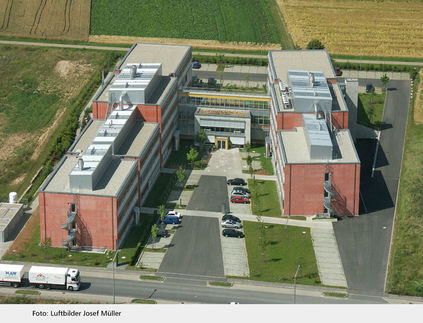MDS PROTEOMICS OPENS NEW PATHWAY TO FASTER DRUG DEVELOPMENT
Anzeigen
TORONTO - January 9, 2002 - Researchers from MDS Proteomics Inc. today announced that they have developed and industrialized new ways to look at human cells in action, gaining novel insights into disease processes and leading to faster drug development. This research capability will be shared with MDS Proteomics' partners and used internally by the company to identify 1,000 new drug targets over the next five years. Details of the yeast study are reported in the January 10 edition of the scientific journal, Nature.
The MDS Proteomics platform is designed to determine the function of human proteins that play key roles in disease and to identify those proteins that are drug targets. As a demonstration of its ultra-sensitive platform, MDS Proteomics completed a pilot project applied to a yeast model organism and successfully identified 531 proteins of unknown function. The company chose yeast because it is well understood, and it further focused on the regulation pathways of yeast in particular, as they are analogous to those in human cells. By understanding both the function and regulation of protein pathways in yeast cells, MDS Proteomics has laid the foundation for the development of better therapeutics through the selection of safer, more precise drug targets, as well as a deeper understanding of drugs already on the market.
"In a matter of weeks and using only a portion of our capacity, we identified and analyzed the most functionally relevant 25 percent of the yeast proteome. This means that, with our current work in human cells, MDS Proteomics is capable of determining a focused map of a functional and regulatory proteome in a human cell in less than a year," said Frank Gleeson, president and chief executive officer at MDS Proteomics. "In practical terms, this promises to help accelerate the drug discovery process, reduce failure rates of drugs in clinical development and lead to improvements in the productivity of the pharmaceutical industry."
Today's achievement positions MDS Proteomics as the world leader in applying proteomics for the large-scale discovery, functional characterization and regulatory profiling of human protein targets and disease markers. Determining protein function is essential to mastering human biology and treating illness, as proteins do most of the work in the body. Even with the knowledge of the human genome, the structure and activity of an entire cell remains hidden, providing neither a comprehensive understanding of the cause of a disease, nor identifying specific targets for treatment.
"Understanding how proteins work is like being given the manual of how the core of the body works," said Dr. Michael Moran, chief scientific officer at MDS Proteomics and co-author of the study. "To stop the spread of a disease like cancer, the key is to identify, understand and manipulate the interactions among proteins in those pathways involved in that disease process."
Today's announcement underscores the pre-eminence of MDS Proteomics' automated platform for rapidly determining protein function and cell regulation. By fusing biology and mass spectrometry in proprietary ways, MDS Proteomics' technology simultaneously captured approximately three times the number of interactions in protein pathways as did competing approaches including yeast-2 hybrid. During its continued application of this methodology to human cells, MDS Proteomics has seen similar or greater gains in mapping protein interactions. This clearly demonstrates that its platform will provide a more complete picture of protein function and cell regulation by better approximating the native situations in human cells in-vivo, leading to the more specific targeting of drugs against proteins that are directly implicated in disease.
This news also reflects a major breakthrough in speed, which is necessary to enable the vast volumes of data generated by proteomics to be analyzed and filtered for drug discovery purposes in a timely and seamless manner. MDS Proteomics applied its bioinformatics and supercomputing capabilities to continuously search all genomics and proteomics databases on a 24/7 basis to functionally annotate proteins at the rate of one mass spectra per second, which is at least one hundred times faster than alternative systems.
About MDS Proteomics A pioneer in the field of proteomic-enabled drug discovery, MDS Proteomics' goal is to transform the productivity of the pharmaceutical industry in discovering and developing new medicines for the treatment of disease. The company has developed exceptional capabilities in proteomics systems, technology, supercomputing, drug design, screening and biology and is uniquely positioned to build an effective bridge between gene discovery and therapeutic development. This distinctive capability is being used in collaborations with pharmaceutical and biotechnology companies as well as for the development of the company's own product pipeline. In its proteomics facilities in Europe and North America, the company focuses on drug target discovery and validation for both antibody and small molecule therapeutics. MDS Proteomics is a majority-owned subsidiary of MDS Inc. For more information on MDS Proteomics, visit the company's Web site at www.mdsp.com.
About MDS Inc. MDS Inc. (NYSE: MDZ; TSE: MDS) is an international health and life sciences. Its products and services include: laboratory testing, imaging agents for nuclear medicine testing, sterilization systems for medical and consumer products, research and clinical development services for planning and delivery of cancer treatment, analytical instruments to assist in the development of new drugs, and medical/surgical supplies. MDS employs more than 10,000 highly skilled people at its global operations on four continents. Detailed information about the company is available at the MDS Web site at www.mdsintl.com.
Weitere News aus dem Ressort Forschung & Entwicklung
Meistgelesene News
Weitere News von unseren anderen Portalen
Verwandte Inhalte finden Sie in den Themenwelten
Themenwelt Massenspektrometrie
Die Massenspektrometrie ermöglicht es uns, Moleküle aufzuspüren, zu identifizieren und ihre Struktur zu enthüllen. Ob in der Chemie, Biochemie oder Forensik – Massenspektrometrie eröffnet uns ungeahnte Einblicke in die Zusammensetzung unserer Welt. Tauchen Sie ein in die faszinierende Welt der Massenspektrometrie!

Themenwelt Massenspektrometrie
Die Massenspektrometrie ermöglicht es uns, Moleküle aufzuspüren, zu identifizieren und ihre Struktur zu enthüllen. Ob in der Chemie, Biochemie oder Forensik – Massenspektrometrie eröffnet uns ungeahnte Einblicke in die Zusammensetzung unserer Welt. Tauchen Sie ein in die faszinierende Welt der Massenspektrometrie!
























































